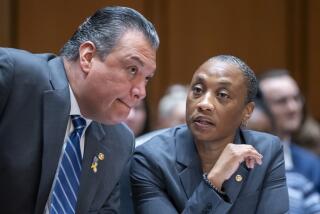House Votes to Override Bush on Chinese Students
WASHINGTON — The House voted Wednesday to override President Bush’s veto of legislation protecting Chinese students in the United States, signaling broad congressional unhappiness with the Administration’s efforts to improve ties with China after the Beijing massacre last June.
The 390-to-25 vote set the stage for a showdown in the Senate today on the legislation, which would lift the requirement that Chinese students must return home after completing their studies here.
Over the past week, Bush has been lobbying heavily and risking his prestige in an effort to avoid the first veto override of his presidency, insisting that he has provided all the legal protection the Chinese students need by issuing administrative actions of his own.
During a breakfast meeting Wednesday with Senate Republicans and at a later press conference, Bush made no new announcements on the issue, thus serving notice that his overtures have failed so far to win the freedom of Chinese dissident Fang Lizhi, who has been holed up in the U.S. Embassy in Beijing since the June crackdown.
Instead, the President stressed that China is of great strategic importance to the United States and that Beijing will cut off further educational exchanges if the legislation allowing Chinese students to remain in America is enacted. The measure, sponsored by California Rep. Nancy Pelosi (D-San Francisco), was vetoed by Bush on Nov. 30.
“One of the reasons I want to stay engaged is that there are geopolitical reasons to have good relations, or improved relations (with China), even under these unsatisfactory conditions,” Bush said at the press conference.
In the Senate, the vote on China is expected to be much closer than in the House, and some analysts believe that Bush has a chance of sustaining his veto. Overriding a presidential veto requires a two-thirds vote. By Wednesday night, Senate supporters of the override said they were still two or three votes short of the 67 needed.
The House action, on the second day of the new legislative session, was a stinging rebuke to Bush. It demonstrated that the Administration cannot expect support for new initiatives toward China that would require congressional approval and could face problems fending off future congressional initiatives to impose economic sanctions against the Chinese regime.
House Speaker Thomas S. Foley (D-Wash.) said the action should not be interpreted as a sign of souring relations between Congress and the White House. “It is not meant to be a provocation, but our obligation under the Constitution,” Foley said.
Foley said the vote demonstrated not only the sentiment in Congress for protecting Chinese students in the United States, but more generally, the “concern about the Chinese government’s repressive conduct and human rights violations.”
The vote to override was bipartisan. Democrats voted 245 to 0, and Republicans 145 to 25, to oppose the Administration.
An estimated 40,000 Chinese students currently are studying in the United States, a number larger than the student delegations of any other nation. The Chinese students are enrolled at schools throughout the country, including large universities as well as smaller, lesser-known campuses, and their wide dispersal has helped give them surprising political clout.
“I represent Texas A&M;, which has over 300 Chinese students,” said Rep. Joe Barton (R-Tex.), one of the many House Republicans who voted against the President, during Wednesday’s floor debate. “. . . We must do all we can to protect the Chinese students.”
Many lawmakers reported receiving stacks of Christmas cards from Chinese students, thanking them for supporting democracy in China. The Chinese students are linked through a computer network that carries minute-by-minute updates on the lobbying effort.
“Don’t tell me the Chinese can’t learn about democracy pretty quickly--at least this crowd can,” said one congressional staff member.
Before the House vote, the Administration managed to attract considerable Republican support for an effort to put off final action on the legislation and send it back for further study in committee. That effort failed 276 to 137.
At his press conference, Bush warned that “the price of the Pelosi bill is lost opportunity for the Chinese scholars of tomorrow. And people should understand that very clearly. The bill is totally unnecessary. The long-term policy consequences are potentially great. And Congress, in my view, will have only itself to blame.”
A handful of lawmakers sought to defend Bush’s China policy. “Effective foreign policy . . . sometimes involves holding your nose with one hand and holding out the other,” said Rep. Robert H. Michel (R-Ill.), the House Republican leader.
But several House members said they mistrust Bush’s assurances because of the secretive nature of his contacts with the Chinese leadership. National Security Adviser Brent Scowcroft and Deputy Secretary of State Lawrence S. Eagleburger were dispatched to Beijing to meet with Chinese leaders in early July, a month after the violence around Tian An Men.
NEW WAYS TO AID CHINESE--Emotional cries locally have given way to quieter efforts. A3
More to Read
Get the L.A. Times Politics newsletter
Deeply reported insights into legislation, politics and policy from Sacramento, Washington and beyond. In your inbox three times per week.
You may occasionally receive promotional content from the Los Angeles Times.










